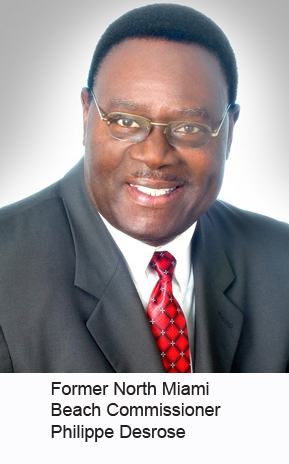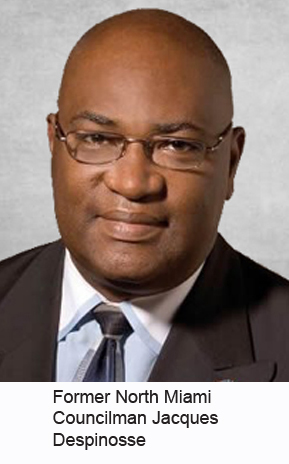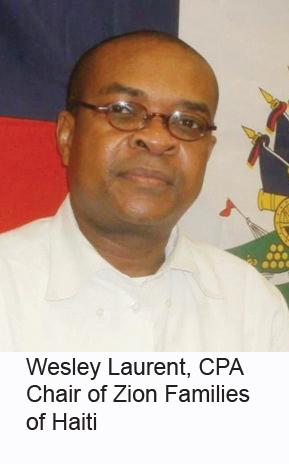By Lorenzo W. Snelling | Special to Le Floridien
Since the assassination of Haiti President Jovenel Moise in 2021, Haiti, especially the capital city of Port-au-Prince, has been in turmoil with gangs terrorizing the country leading to the deaths of hundreds of citizens and kidnappings.
Local Haitian leaders have been urging the federal government to restore law and order in Haiti and they finally got their wish.
The U.S. House of Representatives recently passed the Haiti Criminal Collusion Transparency Act following a plea from Democratic U.S. Congresswoman Sheila Cherfilus-McCormick, who represents portions of Broward and Palm Beach counties.
Cherfilus-McCormick, the only Haitian-American serving in Congress, sponsored bipartisan legislation in June to urge the Biden administration to act fast to safeguard citizens’ lives by beefing up security and crack down on the gangs tormenting people and illicit financial flows.
And Haiti gained additional help when Kenya made a commitment to spearhead a multi-national force in the capital city and other cities, but local Haitian American community leaders believe that’s not a permanent answer.

Nevertheless, Cherfilus-McCormick praised the deployment of Kenya’s national force in Haiti.
“Only Haitians can dictate the future of Haiti, this much-needed assistance provided by the Republic of Kenya will allow Haitians to do just this. Although this announcement comes months later than many of us had hoped, I am grateful that a multilateral intervention is proceeding,” said Cherfilus-McCormick. “I have consistently been advocating for an intervention for over a year, as this remains the most effective solution to restore order and address chaos on the ground. I hope that Haitian authorities and the U.N. Security Council accept Kenya’s offer so the insecurity and humanitarian crises facing the Haitian people can come to an end. I also look forward to hearing more in the coming days about how the U.S. plans to support the multinational intervention and lend a hand to our Caribbean ally.”
The congresswoman said ‘Haiti has seen an exponential surge in gang violence following the assassination of Moïse’.
Citing a report from the United Nations, Cherfilus-McCormick said rapes, sniper killings, and kidnappings have become daily threats due to the rapid increase in gang activity throughout the country.
Compared to the first quarter of 2022, criminal incidents in Haiti more than doubled during the same period in 2023.
Armed gangs intensified their control of strategic areas, increasing violence, including at the main fuel terminal in Port-au-Prince, and preventing the distribution of fuel.

The lack of access to fuel has harshly impacted businesses, schools, and hospitals and created shortages of basic goods including water and telecommunications.
But Kenya’s national force to fight the gangs in Haiti drew nonchalant responses from local Haitian American leaders including former North Miami Beach City Commissioner Philippe Desrose, former North Miami Councilman Jacques Despinossee and Wesley Laurent, who’s part of a non-profit organization (Zion Families of Haiti) that helps Haitian Americans apply for citizenship and work permit.
Philippe Desrose, who has family in Haiti, said he’s pessimistic over Kenya’s efforts to fix the problem permanently for several reasons.
First, he said past missions from the United Nations to combat the anarchy and violence in Haiti was only a temporary solution and the chaos returned.

And second, Desrose said some members in the Haiti government are making it difficult for police forces to dismantle the gangs because they are linked to the violent groups.
Therefore, Kenya’s mission to fix the problem may be ineffective, he said.
“If you talk to the majority of people in Haiti, they don’t believe the force from Kenya in Haiti will stop the problem,” Derose said. “They can patch the roof but don’t fix the entire roof. The problem is still there.”
“Some members in government talk to gang members and make it difficult to resolve the gang problem,” Derose added. “They have more than 150 members of the national police, swat trained units, but never can conduct successful operations. Once one starts, it always leaks out to government members.”
Derose said a long-term solution is Haiti’s police forces need resources from the U.N. to combat the violence including effective equipment and funding for more manpower on the streets.
“The national police in Haiti need some help because they don’t have enough assistance, “he said. “They need equipment and other resources to fight.”
Derose said he last visited Haiti three months to check on family members and his business but the uprising was suppressed at the time.
He said gang members go into hiding during gang crackdown operations (Bwa kale movement) and people felt a little better and safe to walk the streets again.
But once the operations cease, gang activities take over Haiti again.
“It didn’t last long, about two months,” he said.
Like Derose, Jacques Despinossee said Haiti needs a stronger force than Kenya’s national police because the groups don’t have enough manpower and equipment to fight the gangs terrorizing the country.

He said once Kenya finishes the mission, the gangs will run amok again.
“I don’t see how effective Kenya being effective in Haiti,” Despinossee said.
Despinossee said he would rather have U.S. Armed Forces enter Haiti and combat the gangs.
He said the Spanish force was the last to try to restore law and order but failed to achieve the mission.
“U.S. troops get better results,” he said. “That’s what we are expecting.”
According to the former North Miami councilman, Haiti has seen its share of violence since its independence from colonial rule and enslavement in 1804.
But the ongoing gang crisis is perhaps the worst in history.
“I have been to Haiti many times and seen violence,” Despinossee said. “But now Haiti is dealing with gangs. Everyone is in fear.”
Wesley Laurent also said Kenya’s force is not strong enough to get rid of the gangs for good.

Laurent, a Certified Public Accountant (CPA) by trade, said the root of the problem stems from the United State supporting people in power in Haiti who don’t go all out of their way to end poverty.
Laurent said gang violence occurs because people in Haiti are living below the poverty level and have no education opportunities.
He said people are constantly struggling for food to feed their families and finding jobs.
“People don’t have any hope,” said Laurent, who left Haiti over 20 years ago. “When you are a poor country, you will experience constant violence. With no jobs and education opportunities, what do you expect young people to do.”
Laurent said he hopes Kenya’s force can do the job but it’s a long shot because of U.S. involvement in Haiti’s affairs.
“It’s time for the U.S. to let Hati take care of its own business,” he said. “It will never happen.”
